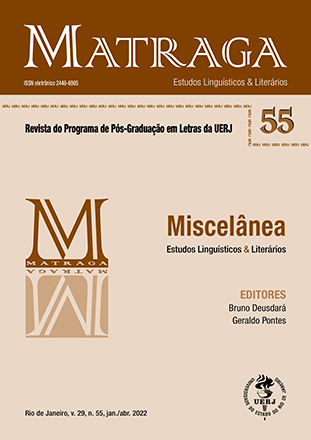O conceito de típico de Slavoj Žižek como mecanismo de manutenção da ideologia em A exceção e a regra
DOI:
https://doi.org/10.12957/matraga.2022.61262Palavras-chave:
A exceção e a regra, típico/tipificação, estranhamento, ideologia.Resumo
Este artigo apresenta uma releitura da peça A exceção e a regra, de Bertolt Brecht, a partir do conceito de típico proposto pelo filósofo esloveno Slavoj Žižek. Trata-se de um estudo bibliográfico de cunho interpretativo, baseado no materialismo lacaniano, uma corrente filosófica recente que atrela a psicanálise de Jacques Lacan ao materialismo histórico de Karl Marx. A releitura por tal viés permite perceber o funcionamento do processo de tipificação, pois, de forma muito didática, Brecht põe em cena as contradições inerentes às relações de poder. Embora o conceito žižekiano seja posterior à criação de A exceção e a regra, é possível perceber o processo de tipificação na peça, e esse recurso funciona como elemento constitutivo do efeito de estranhamento (ou distanciamento), o conceito chave do teatro brechtiano. Crítico contundente do drama burguês, Brecht clamava a necessidade de abandonar a mimese superficial das relações interpessoais, que focavam exclusivamente o indivíduo, para abraçar a coletividade, as estruturas e processo de poder e seu papel praticamente determinante na matriz de comportamentos humanos.
Downloads
Downloads
Publicado
Como Citar
Edição
Seção
Licença
AUTORIZAÇÃO
A Matraga – Revista do Programa de Pós-Graduação em Letras da UERJ está autorizada a publicar o artigo ora submetido, caso seja aceito para publicação online. Fica atestado que a contribuição é original, que não está sendo submetida a outro editor para publicação, e que a presente declaração é a expressão da verdade.
Os trabalhos publicados no espaço virtual da Matraga – Revista do Programa de Pós-Graduação em Letras da UERJ serão automaticamente cedidos, ficando os seus direitos autorais reservados à Matraga. Sua reprodução, total ou parcial, é condicionada à citação dos autores e dos dados da publicação.

A Matraga utiliza uma Licença Creative Commons - Atribuição-NãoComercial 4.0 Internacional.





